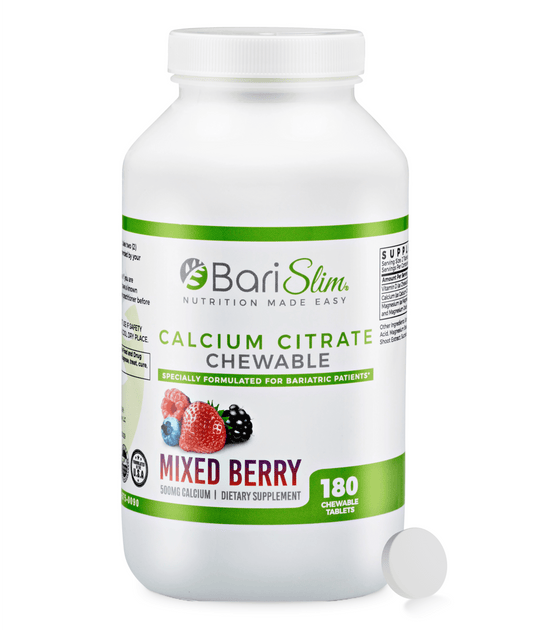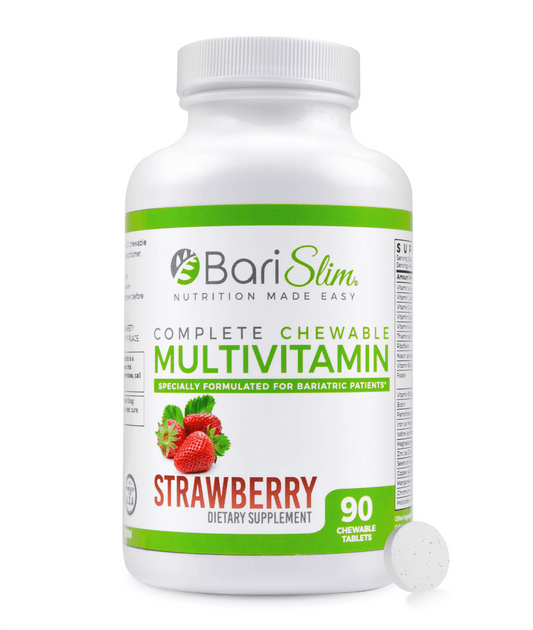Table of Contents
- Why Do Bariatric Surgery Patients Need to Take Vitamins?
- Understanding Nutrient Absorption Post-Surgery
- Addressing Potential Deficiencies
- Comparing Ingredient Concentrations
- Formulation for Targeted Needs
- What Happens if Bariatric Patients Don't Take Vitamins?
- Risks of Insufficient Nutrition
- Long-Term Health Consequences
- Can Bariatric Patients Take Regular Vitamins?
- Assessing Suitability and Effectiveness
- Guidelines and Recommendations by Health Professionals
After bariatric surgery, your body undergoes significant changes, not only in weight but also in its ability to absorb vitamins and minerals. This is due to the alterations made to your digestive system, which can impact how effectively it absorbs nutrients. Taking regular vitamins might not meet the altered nutritional needs post-surgery. Understanding the kind of supplements you require to maintain optimal health and support your weight loss journey is essential.
Adjustments in your diet and lifestyle post-surgery are critical, including a vitamin regimen tailored to your new nutritional needs. Since over-the-counter vitamins are typically formulated for individuals with an unaltered digestive system, they may not be suitable for your unique situation. Therefore, it's imperative to discern the difference between regular vitamins and those specifically formulated for bariatric patients.
Ensuring you receive proper vitamin supplementation involves adhering to a regimen that takes into account your revised capacity for nutrient absorption. Bariatric-specific vitamins are created with these factors in mind, potentially preventing deficiencies that could hinder your progress. Your healthcare provider can guide you in choosing the right kind of supplements to complement your diet and lifestyle changes, thereby safeguarding your health as you advance towards your weight loss goals.
Why Do Bariatric Surgery Patients Need to Take Vitamins?
After bariatric surgery, your body undergoes significant changes in how it absorbs nutrients, making a specialized vitamin regimen crucial for maintaining optimal health.
Understanding Nutrient Absorption Post-Surgery
Post-bariatric surgery, your stomach's capacity is reduced, which can be due to procedures such as sleeve gastrectomy or gastric bypass. This smaller stomach size limits the amount of food you can consume and also alters the digestion and absorption process of nutrients. Critical changes in the gastrointestinal tract affect the body’s ability to absorb vitamins and minerals effectively because less surface area is available for nutrient absorption. In particular, your ability to absorb fat-soluble vitamins, such as Vitamin D, as well as minerals like calcium citrate, is impacted due to the reduced intake and digestion of dietary fats.
- Vitamin D & Calcium Absorption: Reduced absorption surface area post-surgery leads to decreased Vitamin D and calcium uptake.
- Iron Absorption Challenges: Modifications in the stomach and small intestine can hinder iron absorption, increasing the risk of iron deficiency.
Addressing Potential Deficiencies
To prevent nutritional deficiencies, you will need to take a tailored vitamin regimen designed for bariatric patients. This regimen should include:
- Multivitamins: They contain a balanced mix of essential vitamins and minerals.
- Calcium Citrate Supplements: Preferably taken separately from the multivitamin to enhance absorption.
- Vitamin D: Often included in higher doses due to malabsorption issues.
- B-Complex Vitamins: Thiamin and folate are particularly important as deficiencies in these can develop quickly after surgery.
- Iron: Additional supplementation may be necessary, especially for menstruating women.
- Trace Minerals: Additional copper and zinc may be needed to balance the alterations in absorption.
It is important to follow your healthcare provider's recommendations for a vitamin regimen because they are tailored to your specific needs post-surgery. Regular monitoring can prevent vitamin deficiencies and support your overall health and weight loss goals.
Comparing Ingredient Concentrations
Bariatric vitamins are designed with higher concentrations of certain nutrients compared to regular multivitamins. To illustrate:
- Vitamin D: After bariatric surgery, your body's ability to absorb vitamin D is reduced. Bariatric multivitamins generally contain increased amounts of vitamin D to compensate for this.
- Calcium Citrate: Unlike calcium carbonate, calcium citrate is more easily absorbed post-surgery. Bariatric supplements often contain this form of calcium, and dosage might be higher than in standard supplements.
- Iron: Iron absorption can be significantly impacted post-surgery. Bariatric vitamins might offer more easily absorbable forms of iron in higher doses to prevent deficiency.
Regular multivitamins usually have a balanced concentration that might not meet the elevated needs after bariatric surgery.
Formulation for Targeted Needs
The formulation of bariatric vitamins is not just about increased nutrient levels; it's about targeted support. Here's what you should look for:
- Form: Bariatric multivitamins often come in chewable or liquid forms, making them easier to ingest and absorb for someone with altered gastrointestinal anatomy.
- Minerals: Given that your ability to consume and absorb mineral supplements might be limited post-surgery, bariatric-specific formulations include optimized quantities and forms of essential minerals.
- Multivitamins: Rather than taking multiple supplements, a comprehensive bariatric multivitamin can offer a convenient, all-in-one solution tailored for your post-surgical nutritional regimen.
Choosing a bariatric-specific multivitamin ensures that your body receives the right support for a healthy recovery and long-term well-being. Regular vitamins are generally not formulated with this level of detail to accommodate your unique absorption challenges.
What Happens if Bariatric Patients Don't Take Vitamins?

After bariatric surgery, your body's ability to absorb nutrients is reduced, making vitamin supplementation crucial. Without adequate vitamins, you can face significant health issues.
Risks of Insufficient Nutrition
- Vitamin Deficiency: Post-surgery, your reduced stomach size and altered digestive tract impair absorption of essential vitamins and minerals. Lacking these, you might experience fatigue, muscle weakness, and an inability to concentrate.
- Mineral Shortfall: Essential minerals such as calcium and iron may fall short in your diet post-bariatric surgery. You could develop anemia from insufficient iron, leading to fatigue and weakness. A lack of calcium can result in brittle nails and weaken your bones
Long-Term Health Consequences
- Anemia: Without proper levels of folate and vitamin B12, necessary for red blood cell production, you're at risk of developing anemia, causing fatigue and potential heart palpitations.
- Osteoporosis: Long-term mineral deficiencies, particularly calcium, can lead to weakened bones, increasing the risk of fractures and osteoporosis.
- Muscular Issues: Adequate protein intake and vitamins are essential for muscle recovery and strength. Without them, you may experience ongoing muscle weakness and reduced functionality.
Can Bariatric Patients Take Regular Vitamins?

After undergoing bariatric surgery, your approach to supplement intake must be adapted to your modified digestive system to ensure proper nutrition and vitamin absorption.
Assessing Suitability and Effectiveness
When considering vitamin supplements after bariatric surgery, it's crucial to evaluate the suitability and effectiveness of regular vitamins versus those specifically designed for bariatric patients. Regular vitamins may not offer the same level of absorption as bariatric-specific supplements because the surgical alteration to your digestive system changes how nutrients are processed. Your physician or bariatric surgeon will likely recommend a bariatric multivitamin, which typically contains higher levels of certain nutrients that are at risk of deficiency post-surgery, such as Vitamin A, Vitamins K, Vitamin E, and Selenium.
- Vitamin A: Essential for vision, immune function, and skin health.
- Vitamins K: Crucial for blood clotting and bone health.
- Vitamin E: An antioxidant that helps protect cells from damage.
- Selenium: Plays a role in thyroid function and has antioxidant properties.
You should take vitamins in forms that are easier to absorb, such as chewable tablets or liquid supplements.
Guidelines and Recommendations by Health Professionals
The American Society for Metabolic and Bariatric Surgery (ASMBS) provides guidelines on vitamin supplementation for bariatric surgery patients. Adhering to these guidelines is important to avoid nutrient deficiencies and to maintain overall health. A typical vitamin regimen after bariatric surgery may include:
- A daily bariatric multivitamin with 200% of the daily values of most vitamins and minerals.
- Calcium citrate, as calcium carbonate is less well absorbed post-surgery.
- Vitamin B12 in sublingual form, nasal spray, or as an injection if necessary.
- Other supplements as recommended by your healthcare provider, based on individual needs and diagnosis.
Consult your healthcare professional before starting any new vitamin regimen to ensure it's tailored to your specific nutritional needs. Your nutrition plan will likely be adjusted over time, based on regular blood work and your body's responses to surgery. Noticeable symptoms or lab deficiencies may prompt changes to your regimen, but always under medical advice.



 Order Free Sample
Order Free Sample





